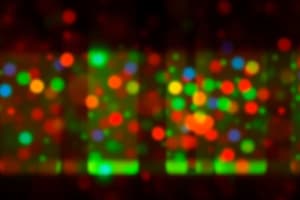Podcast
Questions and Answers
What is the main purpose of using detergent in western blotting?
What is the main purpose of using detergent in western blotting?
- To disrupt non-covalent bonds within and between proteins
- To denature proteins and other macromolecules
- To prevent nonspecific binding of the antibody (correct)
- To add an overall negative charge to all proteins in the sample
Which type of detergent is commonly used for solubilizing most proteins by disrupting non-covalent bonds within and between proteins?
Which type of detergent is commonly used for solubilizing most proteins by disrupting non-covalent bonds within and between proteins?
- Anionic detergents
- Non-ionic detergents
- Sodium dodecyl sulfate (SDS) (correct)
- Sodium deoxycholate and sodium cholate
What is the minimum concentration of protein extract recommended for sample preparation to avoid loss of protein and large volumes of samples to be loaded onto gels?
What is the minimum concentration of protein extract recommended for sample preparation to avoid loss of protein and large volumes of samples to be loaded onto gels?
- 0.5 mg/mL
- 1–5 mg/mL
- 2 mg/mL
- 0.1 mg/mL (correct)
Which type of detergent is considered mild surfactants, typically not disrupting protein-protein interactions, and generally not denaturing proteins?
Which type of detergent is considered mild surfactants, typically not disrupting protein-protein interactions, and generally not denaturing proteins?
What is the purpose of adding an equal volume of 2X Laemmli sample buffer to a specific volume of protein?
What is the purpose of adding an equal volume of 2X Laemmli sample buffer to a specific volume of protein?
What is the purpose of Western Blotting (WB) technique?
What is the purpose of Western Blotting (WB) technique?
Which method is a prerequisite for Western blotting?
Which method is a prerequisite for Western blotting?
What is the composition of NP-40 buffer used in sample preparation for Western blotting?
What is the composition of NP-40 buffer used in sample preparation for Western blotting?
What is the role of detergents in biomedical laboratories?
What is the role of detergents in biomedical laboratories?
What principle does Western Blotting rely on for the identification of specific proteins?
What principle does Western Blotting rely on for the identification of specific proteins?
Anionic detergents like sodium dodecyl sulfate (SDS) disrupt non-covalent bonds within and between proteins, denaturing them, and resulting in the loss of their native conformation and function.
Anionic detergents like sodium dodecyl sulfate (SDS) disrupt non-covalent bonds within and between proteins, denaturing them, and resulting in the loss of their native conformation and function.
Sodium deoxycholate and sodium cholate are non-ionic detergents.
Sodium deoxycholate and sodium cholate are non-ionic detergents.
Non-ionic detergents generally denature proteins and disrupt protein-protein interactions.
Non-ionic detergents generally denature proteins and disrupt protein-protein interactions.
The purpose of using detergent in western blotting is primarily to solubilize proteins.
The purpose of using detergent in western blotting is primarily to solubilize proteins.
The amphiphilic property of detergents allows them to prevent nonspecific binding in immunochemical assays and protein crystallization.
The amphiphilic property of detergents allows them to prevent nonspecific binding in immunochemical assays and protein crystallization.
The SDS PAGE technique is not a prerequisite for Western blotting.
The SDS PAGE technique is not a prerequisite for Western blotting.
NP-40 buffer contains 0.5% sodium deoxycholate.
NP-40 buffer contains 0.5% sodium deoxycholate.
RIPA buffer contains 0.1% SDS (sodium dodecyl sulphate).
RIPA buffer contains 0.1% SDS (sodium dodecyl sulphate).
Detergents used in biomedical laboratories are not amphiphilic molecules.
Detergents used in biomedical laboratories are not amphiphilic molecules.
Western Blot (Immunoblotting) technique aims to identify DNA within a complex mixture.
Western Blot (Immunoblotting) technique aims to identify DNA within a complex mixture.
Flashcards are hidden until you start studying
Study Notes
Western Blotting Detergents
- Purpose of using detergent: To solubilize proteins and improve their accessibility to antibodies.
- Common detergent: Sodium dodecyl sulfate (SDS) is widely used for solubilizing most proteins.
- SDS properties: Disrupts non-covalent bonds within and between proteins, leading to denaturation.
- Recommended protein extract concentration: Minimum 1 mg/mL to minimize protein loss and sample volume.
- Mild detergent: Non-ionic detergents like NP-40 are considered milder, preserving protein-protein interactions and minimizing denaturation.
- Adding 2X Laemmli sample buffer: Creates a stable sample with a defined volume for loading onto gels, and denatures proteins for SDS-PAGE.
Western Blotting Technique
- Purpose of Western Blotting: To detect specific proteins within a complex mixture.
- Prerequisite for Western Blotting: SDS-PAGE (Sodium dodecyl sulfate-polyacrylamide gel electrophoresis) to separate proteins based on size.
- Western blotting relies on: Antigen-antibody interactions to specifically identify proteins.
- Amphiphilic property of detergents: Prevents nonspecific binding in immunochemical assays and protein crystallization.
Detergents in Biomedical Laboratories
- Role of detergents: Used for solubilizing proteins and disrupting membranes.
- Types of detergents:
- Anionic detergents: Denature proteins, e.g., SDS.
- Non-ionic detergents: Generally do not denature proteins, e.g., NP-40.
Buffer Compositions
- NP-40 buffer: Contains 0.5% sodium deoxycholate.
- RIPA buffer: Contains 0.1% SDS.
Additional Information
- Sodium deoxycholate and sodium cholate are non-ionic detergents and do not denature proteins.
- Western blotting technique is used to identify proteins, not DNA.
Studying That Suits You
Use AI to generate personalized quizzes and flashcards to suit your learning preferences.




